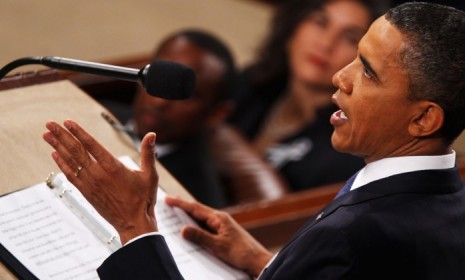Obama's State of the Union: Hits and misses
The reviews are in for the president's second SOTU address. What points were his biggest scores — and how did he fall short?

A free daily email with the biggest news stories of the day – and the best features from TheWeek.com
You are now subscribed
Your newsletter sign-up was successful
President Obama's second State of the Union address, delivered Tuesday evening, met with mostly positive reviews. While some viewers found the hour-long speech short on entertainment value, most approved of its content. Now that the dust has settled, commentators are debating which elements of the address were most successful — and where the president could have done better. Here, a rundown of Obama's hits and misses:
HITS
His bipartisanship
The Week
Escape your echo chamber. Get the facts behind the news, plus analysis from multiple perspectives.

Sign up for The Week's Free Newsletters
From our morning news briefing to a weekly Good News Newsletter, get the best of The Week delivered directly to your inbox.
From our morning news briefing to a weekly Good News Newsletter, get the best of The Week delivered directly to your inbox.
In a single speech, Obama "shrewdly... ended the anger of our politics," says Howard Fineman in The Huffington Post. The president delivered the "most pro-business speech a Democrat has given" in memory. No wonder Speaker John Boehner was moved to tears. It was a "'Love Train' moment in the capital." There wasn't much in the speech to disdain, says Daniel Stone in Newsweek: "[Obama's] ideas for making the future stronger were about as disagreeable as eliminating world hunger."
His inspirational tone
Although you can criticize his lack of substance, says The Milwaukee Wisconsin Journal Sentinel, Obama "sketched an inspirational vision to meet the latest threats to well-being." The address certainly had its share of "lovely, lofty and optimistic words," says Lynn Sweet in the Chicago Sun-Times. Unless you find "marketing" speak un-lovely, says John Dickerson in Slate. "Win the future," Obama's key soundbite, sounds like "the title of a self-help seminar."
His defense of clean energy
A free daily email with the biggest news stories of the day – and the best features from TheWeek.com
Obama set a goal to get 80 percent of U.S. energy from clean sources by 2035 and outlined "concrete steps" to reach it. This "paean to the importance of clean energy" was good news, says Bryan Walsh in Time, especially when spun as "the key to a more prosperous and job-filled future." Sadly, the president's definition of clean energy included nuclear power and coal, says Michael Kanellos at Green Tech Media. Not exactly a "walloping victory" for the environment.
His "Sputnik" call to arms
Obama's vision of a "contest" with our economic rivals "fought in research labs and classrooms, high-tech start-ups and small businesses" was inspirational, says Alex Altman in Time. And his characterizing it as a "Sputnik moment" was "grim" but appropriate. America can thrive if it's willing to put in the "hard work, smart choices and grit," was his message. It was a "'let's get to work' speech," says Mary McNamara in The Los Angeles Times. And judging from their muted, professional response to his words, Congress "seemed, at least for one small hour, ready, willing and able."
MISSES
No solution to the jobs crisis
Unemployed Americans "were all but ignored at a time of great unemployment." says Mark Penn in The Huffington Post. "He never clearly spoke to them," and offered "no analysis of the unemployment problem and how he would fight it." He may have said the word "jobs" 31 times, says Andrew Leonard in Salon, but "he did not even mention the word 'unemployment.'"
His avoidance of foreign policy
Our allies overseas will be "dismayed by the lackadaisical attitude, verging on indifference," that Obama showed towards foreign policy last night, says Jennifer Rubin in The Washington Post. Yes, "we have big domestic problems." But we ignore issues like "Egypt, Lebanon, the United Nations" and "stalled peace talks" in the Middle East at our peril. "When the U.S. is absent, bad things happen in the world."
No talk of gun control
In the wake of the Arizona shootings, Obama's speech disappointed those who favor a ban on high-capacity gun magazines, reports Ryan J. Reilly at Talking Points Memo. Should they really be surprised? "The White House has [consistently] steered clear of gun control."
Whatever happened to climate change?
Why did Obama "duck and cover entirely on climate"? asks Andrew C. Revkin at The New York Times. It seems that the "C-word" is now "unmentionable" within the Beltway. If the president doesn't engage on the issue this year, "his campaign pledge to have science treated with integrity will appear awfully hollow."